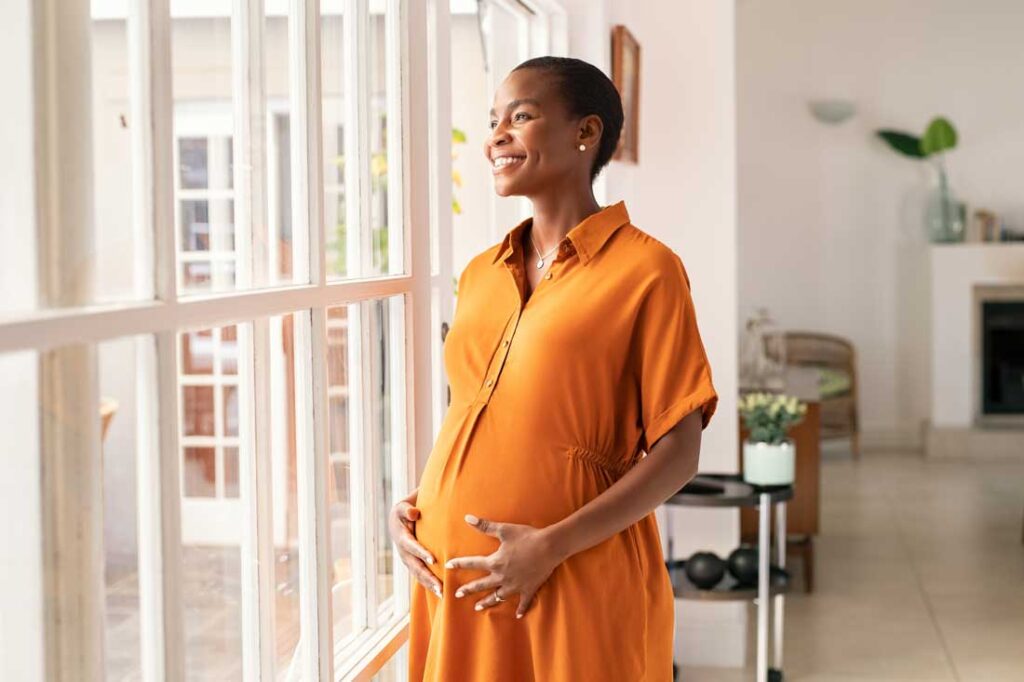My lips are cracked and my mouth is dry.
I haven’t sanitized my hands yet, so I can’t remove the face mask I’ve had on for two hours. I let the air inside my mask grow staler as I dig for the wrinkled manila envelope in my purse.
“Let’s just do it now,” I say to my husband David. We’re standing in the old stairwell of the hospital parking garage. Paint peels from the walls. Rain trickles down the window beside us.
“OK, let’s do it,” he says. His mouth is blocked by a powder-blue medical face mask, but I can see a smile forming in his eyes.
I tear open the envelope and pull out a small slip of paper. On it is a cartoon of a baby with a light pink bow.
“Oh my god!” I scream. My voice echoes through the stairwell. We embrace tightly as we rock side to side. (We were 100% convinced, due to an old wives’ tale about not having morning sickness, that we were having a boy.) I always wanted a baby girl, I think as tears well up in the corners of my eyes.
Being pregnant during COVID
I didn’t picture myself finding out the gender of my first baby in the musty stairwell of a parking garage. But we’re in the midst of a pandemic. The hospital staff wouldn’t let David accompany me for my 20-week ultrasound. After kindly putting up with 10 minutes of my stifled crying, the sonographer offered to put the gender in an envelope. That way, we could open it together at home.
To say this isn’t how I imagined my first pregnancy would be an understatement.
I spent weeks early on agonizing over David, a doctor in his third year of residency, being called to the front lines to treat COVID-19 patients. I’m a little over five months pregnant as I write this essay. The only people to have seen my baby bump are my husband, my brother and my father. I can’t meet other moms at the local pregnancy support group or visit my in-laws in Texas. And I’m not on speaking terms with my own mother, which adds an additional, often stomach-turning layer of stress and sadness to an already trying time.
I have trouble going with the flow. Most people wouldn’t describe me as their spontaneous or impulsive friend, but rather as a planner who likes a schedule. But aren’t adaptability and resilience necessary traits for all new mothers to have? Perhaps now is the perfect time for me to foster them.
Feeling joy during a time of trauma
I open my eyes, still heavy with sleep, to see the first hint of light peeking through the curtains. The sheets rustle as David scooches nearer to me. As I wonder whether I can squeeze in a few more hours of sleep, I feel his hand cradle my belly. “Good morning to my girls,” he says.
After a few minutes of warm cuddling, I check my phone to see the time. It’s 6:30 a.m. I do my typical morning email and text check-in—a routine that now involves looking at the latest COVID-19 numbers in my state, Illinois, which was in the midst of a surge. As I read about the thousands of new cases, my heart rate picks up. Fear and sadness eclipse the blissful state I was in just minutes prior.
It’s hard to fully experience the joy of becoming a mom while a traumatic event is happening outside my door. How can I revel in all of the excitement that’s to come—holding my baby to my chest for the first time, watching her experience all of her “firsts,” seeing David become a dad—when I’m worried about giving birth in a pandemic that has already claimed over 100,000 lives?
Focusing on feeling contentment
As I reconcile these conflicting emotions, I come across an article in The Washington Post about a five-year study designed to figure out which human emotions were not only the most universal, but also the most important. The researchers studied communities across the globe and concluded that feeling contentment—not happiness—was one of the emotions societies valued most.
“In our culture, this emotion is very special. It is the highest achievement of human well-being, and it is what the greatest enlightened masters have been writing about for thousands for years,” the study author’s guide said of the emotion while the researchers were stationed in the Himalayas of Eastern Bhutan.
Feeling contentment versus happiness
Contentment differs from happiness in subtle ways. Where happiness can often be situational or conditional (I’ll be so happy once I get a raise, I’m always happiest when the whole family is together, I would be so happy if I could just retire and travel the world), contentment is feeling fulfilled with one’s current circumstances regardless of what else is happening. It’s not about ignoring what’s going on in the world. Instead, it “comes from our relationship to what is going on around us, rather than our reaction to it. It is the peaceful realization that we are whole and complete just as we are, despite the anger, sadness, joy, frustration and excitement that may come in and out from time to time,” writes the study’s author in a Greater Good magazine article.
I’m guilty of falling victim to the situational, conditional nature of happiness. I often anticipate things I know will make me happy (weddings, big trips, holidays with family) instead of learning to find joy in the small, everyday moments that comprise my life. But sheltering-in-place for over three months of my pregnancy has taught me to embrace the simple pleasures of life and learn what it really means to be content.
Contentment is feeling grateful that me, my husband and our baby-on-the-way are all healthy in spite of the pandemic. It’s appreciating the beautiful light that shines through our fourth-floor condo in the afternoon, or the way my 4-year-old niece says she has a stuffed animal to give me when the virus is over. It’s beaming with joy when I feel my little girl kicking for the first time, or smiling as I show David the itty-bitty hat I bought to bring her home from the hospital in.
Coming to grips with parents’ mistakes parents
A little over a year ago, my mother abruptly left my father for someone else. It was unexpected, and spurred several issues between me and my mother that are unrelated to my father. She and I haven’t spoken in several months, since the early days of my pregnancy.
Being pregnant in near-isolation without a mother to speak to hasn’t been easy. We used to be close. I always thought she’d play a large role not only in my pregnancy, but also in my baby’s life. Now, I’m not sure what will happen.
When we’re young, many of us think our parents are perfect. It can be hard when we finally realize that these people who raised us—who we put on a pedestal—are often flawed in more ways than one. Like everyone, they make mistakes. Sometimes, they make lots of them.
As I think about the chasm between my mother and myself, I begin to realize something that makes me uneasy: Like everyone, I too am flawed. It’s likely that I will make mistakes as a mother. I tend to worry excessively, which I know could cause my daughter to do the same. I struggle with body image issues and obsess about my weight, and fear that despite my attempts to not show this side of myself to my daughter, I might still project these beliefs onto her.
The thought of making mistakes as a mother is a deeply unsettling but inevitable truth. I cannot prevent mistakes from happening. But hopefully, I can preserve the loving bond my daughter and I will share by controlling how I react when they do occur.
I can teach my daughter about humility and honesty. I can say that I’m sorry when I make a mistake and let her see that just like everyone else, I too am flawed. Perhaps this will teach her that everyone—even her mother—has imperfections. She will too, and that’s something she should embrace, not be ashamed of.
Adopting a new perspective
Though I take pride in being a supportive and reliable wife, daughter, sister and friend, I’ve always veered on the side of being a people-pleaser. I avoid confrontation and arguments like the plague. In fact, I tend to be ready the moment anyone needs me—even if I’m inconvenienced. I have serious trouble saying no. I often feel sick to my stomach if I think someone doesn’t like me or is mad at me.
Growing up, I was taught that putting myself first was wrong. Because of this, my life has been punctuated by the fear that it’s selfish to put my needs others’. This small but impactful lesson has been hard to unwire from my brain. It’s taken me 30 years to figure out how, and I’m still working on it.
Being pregnant has forced me to adopt a new perspective, as someone new now comes first: my baby. Every decision made from here on out—from whether or not to raise her with religion to where to call home when David’s residency is over—will be in her best interests, followed by mine and my husband’s.
As long as our guiding principle is doing what’s best for her, I know we’ll be on the right path.
Living under the expectation that I should put others’ needs before my own has contributed to my battle with anxiety. I would never want that for my daughter. Eventually, we will teach her to follow her heart, even if she worries it will go against what my husband and I envision for her. We’ll show her that it’s not wrong or selfish to put herself first, but rather a necessity.
Learning to feel contentment
I’ve always been an introspective person—after all, I’m currently writing in my 24th journal. But being pregnant during a pandemic has allowed for substantial reflection and contemplation. I’ve learned that I need to be more adaptable and resilient. To focus more on cultivating and feeling contentment rather than anticipating happiness. I have accepted that I am flawed in more ways than one, and will inevitably make mistakes as a mother. I’ve embraced putting myself and my baby first, and teaching my daughter to do the same once she’s old enough.
These small lessons have helped me reframe what I originally saw as a less than ideal pregnancy.
I don’t have a mom to share ultrasound photos or talk about first kicks with. But I do have a terrific husband, wonderful mother-in-law and incredibly supportive father, twin brother and friends by my side. I haven’t been able to join any local mom groups, but I’ve found some surprisingly comforting communities online. We had to cancel our two-week babymoon to Italy, but we’re set to have a relaxing weekend getaway on the beach in northern Michigan instead. No one has seen my baby bump, but I’m bloated and my face is riddled with hormonal acne, so… maybe that’s not the worst thing in the world. David hasn’t been able to attend my appointments and still hasn’t met my doctor, but so far, we have a healthy baby, and that’s all that matters.
Focusing on what I can control when raising my daughter
As I ponder reframing my inner world in order to find and feel more peace, contentment and fulfillment and to be the best mother I can be, I worry about the external world we’re bringing a baby into. So far, 2020 has been ravaged by a pandemic that has taken over 100,000 American lives. We’ve seen unspeakable hatred and violence toward Black members of our community. A potential recession is looming.
I may not be able to control the world around my daughter, but I can control the home we raise her in. And I’ll make sure it’s one filled with joy, honesty, humility, curiosity, acceptance, playfulness, warmth and, above all else, love.
This article originally appeared in the September/October 2020 issue of SUCCESS magazine and has been updated. Photo by Ground Picture/Shutterstock










